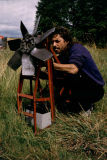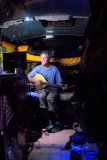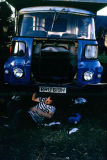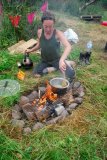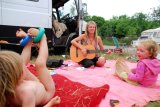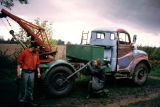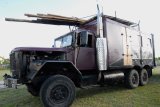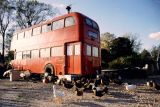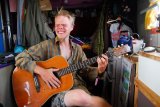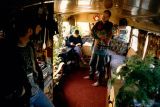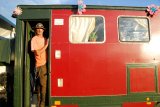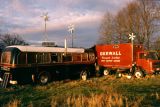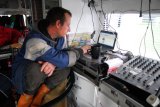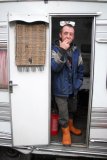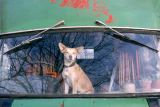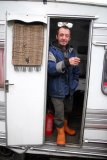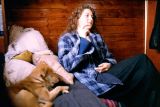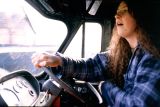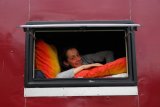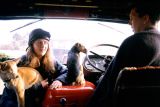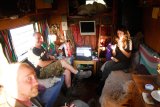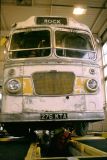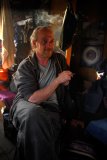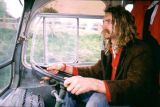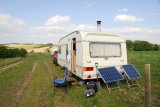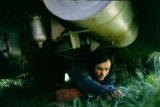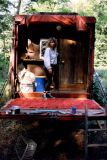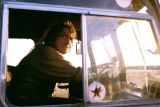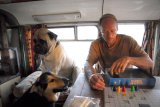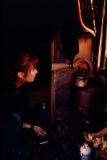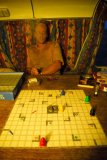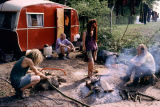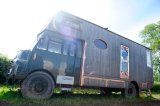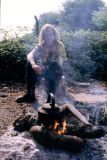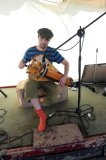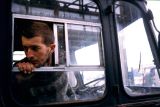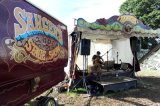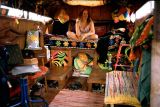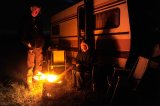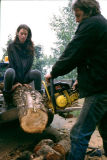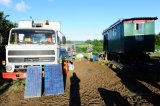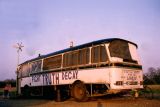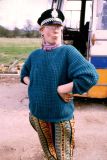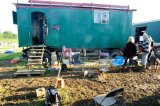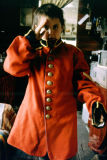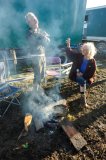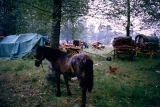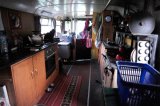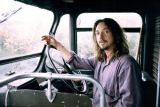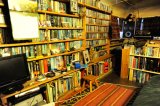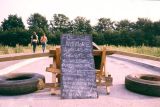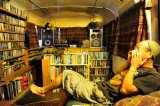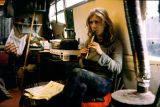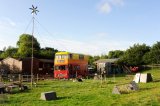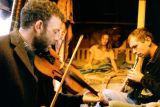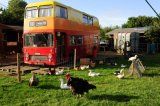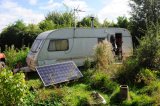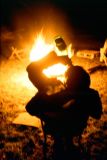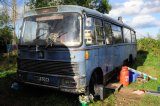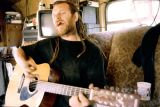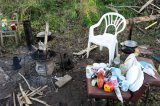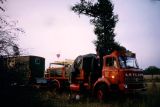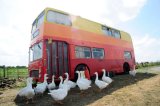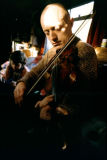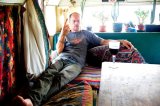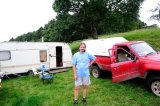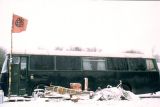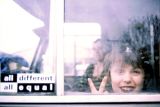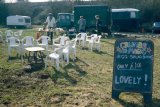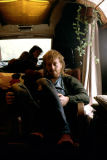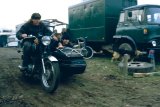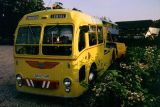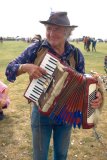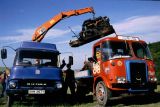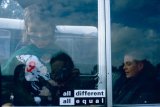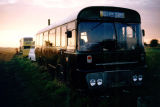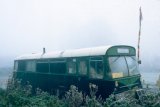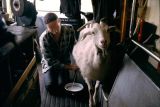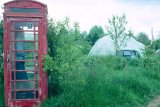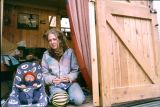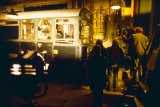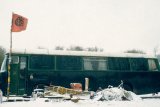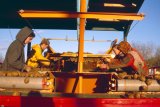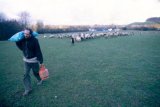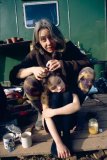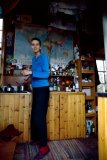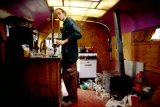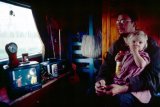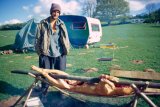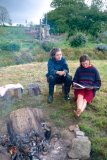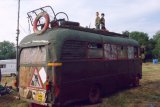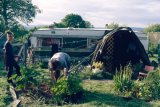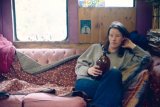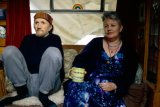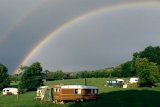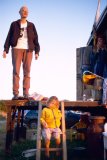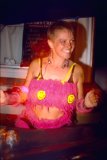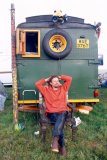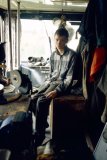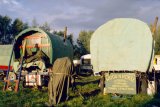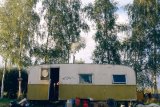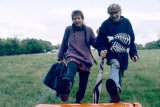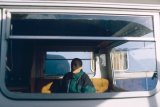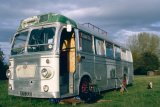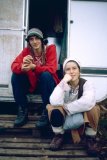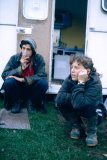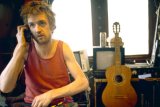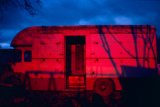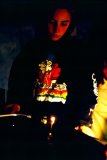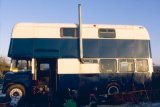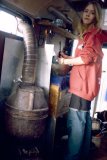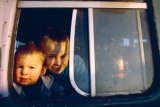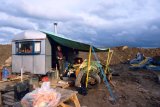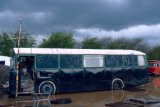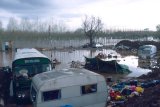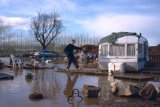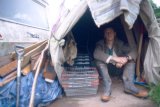Hedge Monkeys and Soap Dodgers
"Hedge Monkeys and Soap Dodgers" is a derogatory term sometimes applied to New Age Travellers.
New Age Travellers(from Wikipedia)
New Age Travellers are groups of people who often espouse New Age (or so-called "hippie", "gypsy") beliefs, and travel between music festivals and fairs, in order to live in a community with others who hold similar beliefs. Their transport and homes consist of vans, lorries, buses, cars and caravans converted into mobile homes. They also make use of improvised bender tents, tipis and yurts. 'New Age' travellers largely originated in 1980s and early 1990s Britain. A number continue to travel the country to this day.
Background
The movement originated in the free festivals of the 1970s such as the Windsor Free Festival, the early Glastonbury Festivals, Elephant Fayres and the huge Stonehenge Free Festivals in Great Britain. However there were longstanding precedents for travelling cultures in Great Britain, including travelling pilgrims, itinerant journeymen and traders, as well as Romany peoples and others. Later events included the Castlemorton Common Festival, a huge free and unlicensed event which attracted widespread media coverage and prompted government action.
Peace Convoy
In the UK during the 1980s the Travellers' mobile homes- generally old vans, trucks and buses (including double-deckers)- moved in convoys. The movement had faced significant opposition from the British government and from mainstream media, epitomised by the authorities' attempts to prevent camps at Stonehenge, and the resultant 'Battle of the Beanfield' in 1985- the largest mass civil arrest in English history.
In 1986 and subsequent years police again blocked the "Peace Convoy" (as they then identified themselves) from "taking the Stones" on the Summer Solstice (June 21). This led Travellers to spend summers squatting by the hundreds on several sites adjacent to the A303 in Wiltshire.
Contemporary British travelling scene
Many people see the Castlemorton Common Festival in 1992, a week-long festival that attracted up to 30,000 travellers and ravers, as a significant turning point for New Age Travellers in Britain, as it directly resulted in the government granting new powers to police and local authorities under the Criminal Justice and Public Order Act 1994 to prevent such events in the future. The Criminal Justice Act included sections against disruptive trespass, squatting and unauthorised camping which made life increasingly difficult for travellers, and many left Britain for Ireland and Europe, particularly Spain.
However, thousands of people still live a traveller lifestyle in Britain. As of 2010 they are normally known simply as Travellers. Few, if any, travellers live on the local authority sites reserved for Gypsies, Scottish Gypsies/Travellers and Irish Travellers, so instead stay on unauthorised sites throughout the countryside, particularly in Wales and the south-west of England, and in urban areas. London hosts a large number of traveller sites in places such as disused factory or warehouse yards, and there is often a crossover between travellers and squatters, with travellers parking up in yards attached to squatted buildings. Typical traveller sites might have anywhere from 5 to 30 vehicles on them, including trailers and caravans as well as buses, vans and horseboxes converted to live in. Although most Travellers in Britain are British, large numbers of Continental Europeans also "travel" in the UK.
As unauthorised sites are evicted and travellers moved on frequently, accessing basic services such as health and dental care, refuse collection, benefits and education for children can be problematic. Many traveller families home-school their children.
Although travellers have only taken to the road since the 1960s, as of 2010 many traveller families have reached their third or fourth generation. Despite widespread popular assumptions about travellers living on state handouts, many do seasonal or temporary work, on farms and building sites or in factories and pubs for example. Others work as self-employed mechanics, electricians and plumbers, or make money selling scrap, or running stalls at markets and car boot sales. Festivals during the summer also present many opportunities for travellers to make money through offering entertainment, services and goods to festival goers. A high level of mutual aid, the sharing of childcare and vehicle maintenance and "skipping" (collecting food from local supermarket skips) within communities allow travellers to live on very low incomes.
The Traveller and Free Party scenes often have close links, and many travellers run or are involved with the sound systems of raves and squat parties.
The above comes from Wikipedia but for a more detailed account of the New Travellers scene in the UK please check out the book "Travelling Daze", which happens to include a chapter on my own personal travelling history along with some of my photography, from Enabler Publications.
www.enablerpublications.co.uk
New Age Travellers(from Wikipedia)
New Age Travellers are groups of people who often espouse New Age (or so-called "hippie", "gypsy") beliefs, and travel between music festivals and fairs, in order to live in a community with others who hold similar beliefs. Their transport and homes consist of vans, lorries, buses, cars and caravans converted into mobile homes. They also make use of improvised bender tents, tipis and yurts. 'New Age' travellers largely originated in 1980s and early 1990s Britain. A number continue to travel the country to this day.
Background
The movement originated in the free festivals of the 1970s such as the Windsor Free Festival, the early Glastonbury Festivals, Elephant Fayres and the huge Stonehenge Free Festivals in Great Britain. However there were longstanding precedents for travelling cultures in Great Britain, including travelling pilgrims, itinerant journeymen and traders, as well as Romany peoples and others. Later events included the Castlemorton Common Festival, a huge free and unlicensed event which attracted widespread media coverage and prompted government action.
Peace Convoy
In the UK during the 1980s the Travellers' mobile homes- generally old vans, trucks and buses (including double-deckers)- moved in convoys. The movement had faced significant opposition from the British government and from mainstream media, epitomised by the authorities' attempts to prevent camps at Stonehenge, and the resultant 'Battle of the Beanfield' in 1985- the largest mass civil arrest in English history.
In 1986 and subsequent years police again blocked the "Peace Convoy" (as they then identified themselves) from "taking the Stones" on the Summer Solstice (June 21). This led Travellers to spend summers squatting by the hundreds on several sites adjacent to the A303 in Wiltshire.
Contemporary British travelling scene
Many people see the Castlemorton Common Festival in 1992, a week-long festival that attracted up to 30,000 travellers and ravers, as a significant turning point for New Age Travellers in Britain, as it directly resulted in the government granting new powers to police and local authorities under the Criminal Justice and Public Order Act 1994 to prevent such events in the future. The Criminal Justice Act included sections against disruptive trespass, squatting and unauthorised camping which made life increasingly difficult for travellers, and many left Britain for Ireland and Europe, particularly Spain.
However, thousands of people still live a traveller lifestyle in Britain. As of 2010 they are normally known simply as Travellers. Few, if any, travellers live on the local authority sites reserved for Gypsies, Scottish Gypsies/Travellers and Irish Travellers, so instead stay on unauthorised sites throughout the countryside, particularly in Wales and the south-west of England, and in urban areas. London hosts a large number of traveller sites in places such as disused factory or warehouse yards, and there is often a crossover between travellers and squatters, with travellers parking up in yards attached to squatted buildings. Typical traveller sites might have anywhere from 5 to 30 vehicles on them, including trailers and caravans as well as buses, vans and horseboxes converted to live in. Although most Travellers in Britain are British, large numbers of Continental Europeans also "travel" in the UK.
As unauthorised sites are evicted and travellers moved on frequently, accessing basic services such as health and dental care, refuse collection, benefits and education for children can be problematic. Many traveller families home-school their children.
Although travellers have only taken to the road since the 1960s, as of 2010 many traveller families have reached their third or fourth generation. Despite widespread popular assumptions about travellers living on state handouts, many do seasonal or temporary work, on farms and building sites or in factories and pubs for example. Others work as self-employed mechanics, electricians and plumbers, or make money selling scrap, or running stalls at markets and car boot sales. Festivals during the summer also present many opportunities for travellers to make money through offering entertainment, services and goods to festival goers. A high level of mutual aid, the sharing of childcare and vehicle maintenance and "skipping" (collecting food from local supermarket skips) within communities allow travellers to live on very low incomes.
The Traveller and Free Party scenes often have close links, and many travellers run or are involved with the sound systems of raves and squat parties.
The above comes from Wikipedia but for a more detailed account of the New Travellers scene in the UK please check out the book "Travelling Daze", which happens to include a chapter on my own personal travelling history along with some of my photography, from Enabler Publications.
www.enablerpublications.co.uk
